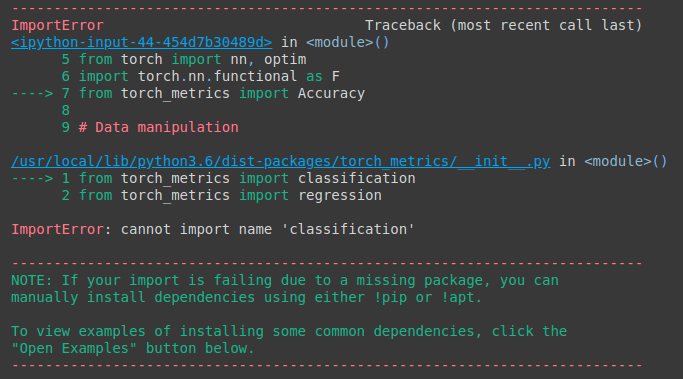Model evaluation metrics for PyTorch
Torch-metrics serves as a custom library to provide common ML evaluation metrics in Pytorch, similar to tf.keras.metrics.
As summarized in this issue, Pytorch does not have a built-in libary torch.metrics for model evaluation metrics. This is similar to the metrics library in PyTorch Lightning.
pip install --upgrade torch-metrics
from torch_metrics import Accuracy
## define metric ##
metric = Accuracy(from_logits=False)
y_pred = torch.tensor([1, 2, 3, 4])
y_true = torch.tensor([0, 2, 3, 4])
print(metric(y_pred, y_true))## define metric ##
metric = Accuracy()
y_pred = torch.tensor([[0.2, 0.6, 0.1, 0.05, 0.05],
[0.2, 0.1, 0.6, 0.05, 0.05],
[0.2, 0.05, 0.1, 0.6, 0.05],
[0.2, 0.05, 0.05, 0.05, 0.65]])
y_true = torch.tensor([0, 2, 3, 4])
print(metric(y_pred, y_true))Metrics from tf.keras.metrics and other metrics that are already implemented vs to-do
- MeanSquaredError class
- RootMeanSquaredError class
- MeanAbsoluteError class
- Precision class
- Recall class
- MeanIoU class
- DSC class (Dice Similarity Coefficient)
- F1Score class
- RSquared class
- Hinge class
- SquaredHinge class
- LogCoshError class
- Accuracy class
- KLDivergence class
- CosineSimilarity class
- AUC class
- BinaryCrossEntropy class
- CategoricalCrossEntropy class
- SparseCategoricalCrossentropy class
To quickly get started with local development, run:
make developTo test, run:
python3 -m pytestTo run pre-commit against all files:
pre-commit run --all-filesPlease raise issues or feature requests here. It will be extremely helpful if you comment on a specific issue before working on it. This provides visibility for others who also intend to work on the same issue. Reference any pull requests to their original issues.


